

1. What is stress and what causes it? Stress generally refers to two things: the psychological perception of pressure, on the one hand, and the body's response to it, on the other, which involves multiple systems, from metabolism to muscles to memory.
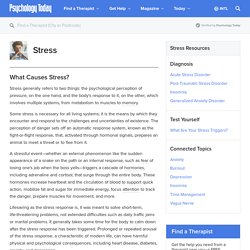
Some stress is necessary for all living systems; it is the means by which they encounter and respond to the challenges and uncertainties of existence. The perception of danger sets off an automatic response system, known as the fight-or-flight response, that, activated through hormonal signals, prepares an animal to meet a threat or to flee from it. A stressful event—whether an external phenomenon like the sudden appearance of a snake on the path or an internal response, such as fear of losing one's job when the boss yells—triggers a cascade of hormones, including adrenaline and cortisol, that surge through the entire body. 2. What is stress? (Video)
3. Stress at the workplace. My thoughts and comments. 1.Signs You’re Too Stressed Out. Some stress is normal, but too much of it isn’t.

What are the warning signs of stress that tell us we’re overly stressed out? There’s No Avoiding Stress We can’t avoid certain stressful situations: never-ending deadlines, your child’s PSLEs, increasing cost of living ($2 for a prata? Daylight robbery!) 2. Stress Screener Test. 3. Stress Test - How Stressed Are You? My thoughts and comments. 1. A whopping 92% of working Singaporeans are stressed – and women are prioritising families over themselves, study finds, Business Insider - Business Insider Singapore. Pexels If you’re feeling stressed at work, you’re not alone.
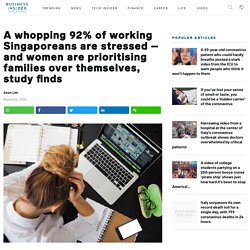
A vast majority of working Singaporeans are under stress, and women in particular feel that it’s less manageable, a survey has found. In the 2019 Cigna 360 Well-Being Survey, a whopping 92 per cent of working Singaporeans report feeling stressed, higher than the global average of 84 per cent. Of this, 13 per cent say their stress is unmanageable, which is on par with the global average, according to the study which surveyed a total of 13,200 online interviews in 23 markets, including 502 residents in Singapore. And stress doesn’t go undetected in the workplace. Read also: 6 in 10 Singaporeans admit that they don’t leave work on time just to ‘show face’
2. Coping one day and crying the next: Work-related burnout is real. SINGAPORE: One day at work, Ms Jamuna Raj was striking off “to-dos” from a neat hand-written list, thinking she had a lid on all her tasks at work.
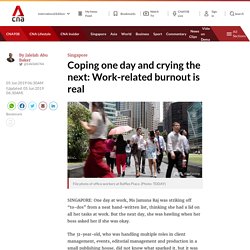
But the next day, she was bawling when her boss asked her if she was okay. The 31-year-old, who was handling multiple roles in client management, events, editorial management and production in a small publishing house, did not know what sparked it, but it was the start of her journey towards realising that she was experiencing burnout. “I was striking the to-dos off, but for every one that I did, there were five more. 3. Singapore ranks 32 out of 40 in new index on work-life balance, Business News. SINGAPORE - Singapore is in the bottom quarter of 40 cities when it comes to work-life balance, according to a new study released on Wednesday (Aug 7).
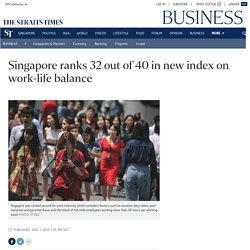
It comes in 32nd place, though it is ranked higher than the other three Asian cities considered - Hong Kong, Tokyo and Kuala Lumpur. This is in part due to the large amount of time that people here dedicate to their jobs. Singapore was ranked second highest for work intensity, which considers factors such as vacation days taken, paid maternal and parental leave, and the share of full-time employees working more than 48 hours per working week. My thoughts and comments. 1. Tips to reduce stress at the workplace. Everyone who has ever held a job has, at some point, felt the pressure of work-related stress.
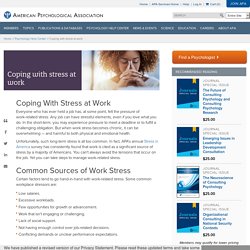
Any job can have stressful elements, even if you love what you do. In the short-term, you may experience pressure to meet a deadline or to fulfill a challenging obligation. 2. Exercise to reduce stress. How does exercise reduce stress, and can exercise really be relaxing?
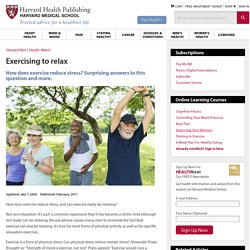
Rest and relaxation. It's such a common expression that it has become a cliche. And although rest really can be relaxing, the pat phrase causes many men to overlook the fact that exercise can also be relaxing. It's true for most forms of physical activity as well as for specific relaxation exercises. 3. Yoga For Anxiety and Stress. Guided Meditation for Stress Relief. My thoughts and comments. Managing Stress at Workplace journal article. Exercise to cope with stress journal article. Stress Management through Yoga journal article. Benefits of mindfulness journal article. Outline AbstractKeywords1.
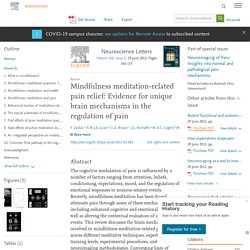
What is mindfulness? 2. Mindfulness meditation practices: focused attention and open monitoring3. Mindfulness meditation and health4. Abstract The cognitive modulation of pain is influenced by a number of factors ranging from attention, beliefs, conditioning, expectations, mood, and the regulation of emotional responses to noxious sensory events. Highlights ► Mindfulness meditation related pain relief involves multiple brain mechanisms. ► Mindfulness meditation reduces pain through unique appraisal mechanisms. ► Mindfulness meditation may share a common final pathway for pain relief. Keywords Mindfulness Meditation Pain Neuroimaging View full text Copyright © 2012 Elsevier Ireland Ltd. Outline.